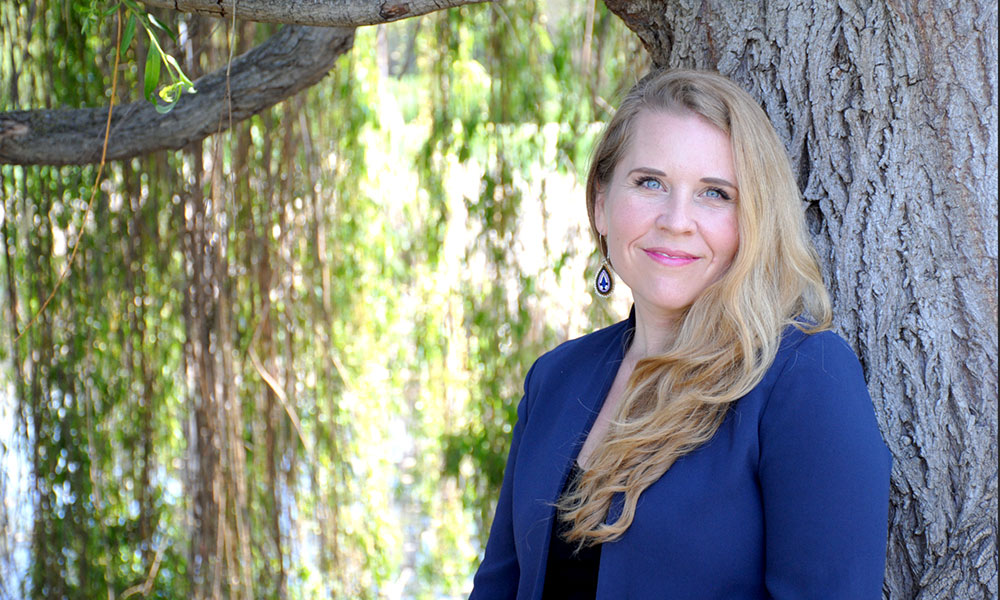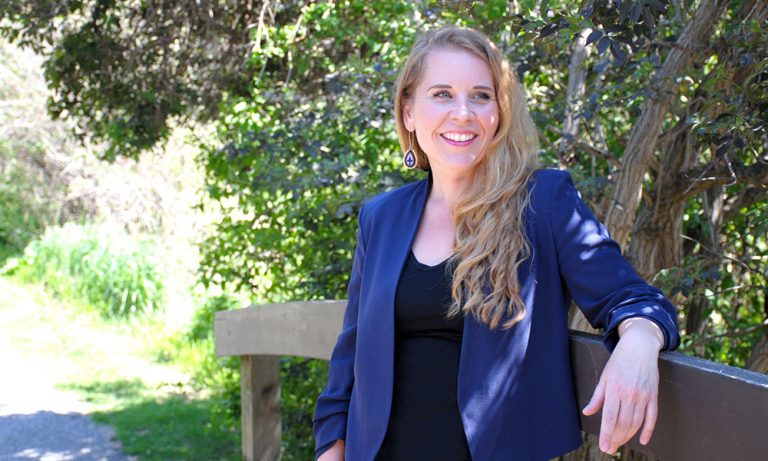ABOUT
Name
Katrina Plamondon
Role
Assistant Professor
School
Nursing
Faculty
Health and Social Development
Campus
Okanagan (Kelowna, BC)
Education
PhD (Interdisciplinary Studies), UBC Okanagan
MSc (Community Health & Epidemiology), University of Saskatchewan
BN, University of Calgary
Hometown
Nelson, BC
“It doesn’t matter where we live — there will always be global health issues and issues related to equity. Research creates a platform to listen to, understand, and amplify a more inclusive set of voices in policy and practice.”
Katrina’s Story
A drive for relational and community-connected work leads UBC Okanagan professor on a path towards health equity.

RAISED IN THE SMALL TOWN OF NELSON, IN BC’S KOOTENAYS — a region known for its connection to nature and quaint mountain communities — Assistant Professor Katrina Plamondon never anticipated how her path in life would unfold.
“I happened to grow up in a bit of an isolated place. I was in love with the nature around it and relatively unaware of a world beyond, and now I’m researching global health,” Plamondon laughs. “I’ve had a bit of a circuitous career, but I believe our paths unfold where they need to. They’re cleared by the feet that walk before us. And my path has always gifted me opportunities in the most serendipitous ways.” Find out more about Nursing
Her love of learning and exploring new ideas led Plamondon to university; she was the first in her family to attend.
“Honestly, before I went to university, I didn’t know much about what happened there! I started working at my family’s bus depot at age 11, and had many other jobs while I was in school. My family worked hard and valued service and connection to community, and I developed a deep value for these things, too.”
After a year of studying sciences at Selkirk College — a community college only 45 km from her home — Plamondon moved provinces and enrolled in the much-larger University of Calgary, where she grappled with feeling disconnected from the world and was overwhelmed by the university’s size. She craved the familiar feeling of being a meaningful part of a community. Then one day she accidentally walked into an orientation session for the nursing program.
“I remember thinking that these people sounded incredibly interesting, and understood something relational and community-connected! So I applied to the program and was accepted right away,” Plamondon remembers. “Calgary’s nursing program was a great experience; I never doubted my choice.”
After fast-tracking through the program in three-and-a-half years, Plamondon was accepted into a Capital Health (now known as Alberta Health Services)-sponsored program for registered nurses. She earned an Advanced Critical Care Nursing post-graduate certificate from Mount Royal College and soon afterwards entered into her role as a cardiovascular intensive care unit nurse.
Plamondon relished the independence of her role and the relationships she formed with patients, families, and other health professionals. But she also knew that working as a cardiovascular nurse wouldn’t be her career forever.
“Nursing is a caring profession that’s human-centred and deeply relational. I care very much about relationality and a relational approach to living, and I somehow knew it wasn’t possible to bring that voice into certain settings.”
DISCOVERING HER NURSING VOICE
Plamondon further explored her chosen field, taking graduate courses in epidemiology and working in emergency medicine. But, it wasn’t until she began her Master of Science in Community Health & Epidemiology that Plamondon finally discovered the passion she had been searching for: health equity.
Her master’s research focused on understanding the relationships between global health financing policies and the experiences of people living in Nicaragua. This work provided the foundation for a path that was becoming common at the time: using research to understand how global-level policies or trends affect people in different ways. During this time Plamondon also worked as a public health nurse, where research taking place with her colleagues and clients in street outreach was starting to raise awareness about the community’s needs.
“It was inspiring to see that research could amplify voices that needed to be heard,” she explains.
Plamondon uses a simple analogy when trying to describe the complexities of health equity. “Think of a forest, where the root systems are the conditions we currently live in, and the soil represents society’s power distribution,” she says. “What we see in the leaves and branches of the trees are the result of what happens deeper down. Leaves that are struggling to survive display symptoms of inequity, while leaves that thrive reveal a greater balance of equity in the soil.”
She adds: “We’ve known for a long time that our actions and the ways we invest in health tend to be preoccupied with behaviours and treating illness rather than dealing with those soil systems and root structures.
“Although there are really good intentions in public and global health, the causes of these public health issues — like obesity or chronic illness — are not only complex, but are also symptomatic of deeper issues, including how society is structured.”
The World Health Organization’s Commission on Social Determinants of Health echoed this statement back in 2008, compiling evidence that established a clear relationship between health inequalities and the unfair distribution of power, wealth and resources.
HEALTH EQUITY DURING COVID-19
Plamondon says the COVID-19 pandemic demonstrates how critical the issues of global health and health equity are in today’s society.
“This pandemic has drawn into sharp focus the relationship between the political economy and our health, and how interconnected it is,” she explains, pointing out that the global economy relies on the mass production of goods by populations already experiencing poorer health and shorter lives than those enjoyed by the people consuming these goods.
“The health of the economy depends on populations healthy enough to keep it afloat, but it’s a house of cards. And when the backs of people holding up the house collapse, the economy falls.”
Plamondon is confident that once researchers look back on the epidemiological story of the COVID-19 pandemic, the inequalities of the world will be magnified.
“We’re already seeing how the pandemic affects populations differentially — and unfairly. In Canada, outbreaks are concentrated among long-term care and industrial institutions, where employees’ own social determinants of health combined with frequent, close contact create the perfect conditions for spreading this virus. Yet, employment laws don’t protect sick workers. These individuals are often migrant workers or new immigrants who face many layers of unearned disadvantage every day. They have limited access to sick pay or job protections, and they’re paid unreasonably low wages.
“Personal protective equipment alone will not solve any of these deeply-rooted systems and societal-level problems.”
And this is where Plamondon’s nursing voice becomes loud and clear. “It doesn’t matter where we live — there will always be global health issues and issues related to equity. Research is how we can make a difference for people who don’t have a loud voice in the policy sector.”
A VOICE FOR ALL
Amplifying the voices that need to be heard continues to be a common thread in Plamondon’s work.
Her current research is ‘knowledge translation science,’ which focuses on how to align knowledge, intention and action for health equity, and how to bring different communities together to promote better health for everyone. She uses dialogue, arts and strategic analyses to support collective reflection on issues of equity. She works with a wide variety of teams, including healthcare systems trying to understand how to address issues of equity in BC’s rural and remote communities and epidemiologists working to integrate equity considerations into opioid overdose surveillance.
But perhaps the work closest to Plamondon’s heart is that which focuses on advancing equity-centred research practice standards in global health.
She looks to her own heritage for inspiration in this last regard. “My maternal Grandmother was Cree, and although she passed away when I was 12, I was really shaped by the time I spent with her.
“My whole life I’ve been invited into work related to health equity in Indigenous communities, and now I understand there’s a reason for that. As I learn more about who I am and where I come from, I continue to learn more about how issues of equity shaped my own family’s experience and life trajectories. As someone of both Indigenous and settler ancestry, I recognize that I am now in an incredible position of privilege. I want to use my voice in a service-oriented way that also honours my grandmother, and all of the grandmothers.”
And Plamondon’s research is impactful. While attending UBC Okanagan for her PhD, she received three prestigious awards from the Canadian Institutes of Health Research (CIHR), and accepted the Frederick Banting and Charles Best Canada Graduate Scholar award. This award came with a $105,000 three-year research stipend to support Plamondon’s doctoral studies. Furthermore, nearing the completion of her PhD, she was recognized as UBCO’s Doctoral Student Researcher of the Year.
Less than a year into her first academic appointment, Plamondon counts more than $1.66 million (CAD) in research funding, 23 peer-reviewed scientific publications and more than 50 provincial, national, and international conference presentations. She teaches and mentors students and emerging leaders, consults with health systems and practice leaders, and serves on national councils and committees related to global health. Through it all, Plamondon’s nursing voice is becoming part of the emerging dialogue about what kind of future we want to create as a global community.
While Plamondon recognizes that health equity is an aspiration that “makes a value judgment about what is tolerable in our society,” she believes the COVID-19 pandemic presents a unifying possibility. “It provides an anchor that invites us all to think about how every choice we make has equity implications.
“This is an opportunity to examine how we organize ourselves and take care of each other on this shared planet. We have the opportunity to restructure and intervene in economic relationships in ways that reduce inequities.
“Our choices can be part of advancing equity or entrenching inequity.”
